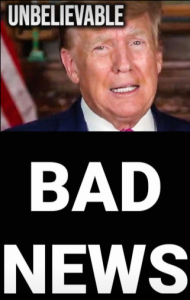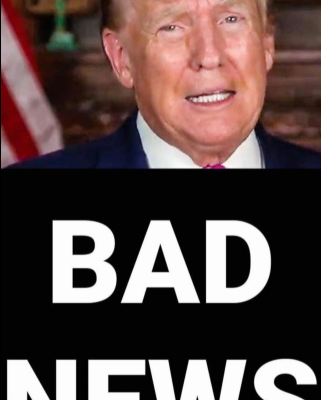
Donald Trump is once again facing a wave of bad news that is shaking his political momentum, testing his resilience, and exposing growing cracks in the foundation of his leadership. In the past few weeks, a combination of legal challenges, political disappointments, and economic warnings has placed him under renewed pressure. What once seemed like an unstoppable comeback now looks uncertain, as events continue to unfold against him.
One of the biggest blows came from the legal front. A federal appeals court ordered a fresh review of Trump’s New York “hush money” conviction, reopening a case that many thought was finally behind him. The court said that lower judges must reconsider the impact of a recent Supreme Court decision about presidential immunity. In simple terms, the decision questions whether certain evidence used in Trump’s conviction should have been allowed at all. While this might seem like a small legal detail, it revives a painful chapter for Trump. Instead of moving forward with a clean slate, he now faces more uncertainty, more hearings, and more public scrutiny of his past. Every new filing, every legal headline, keeps his name tied to scandal and controversy.
Politically, Trump’s grip on the Republican Party is also being tested. In several recent state and local elections, Republican candidates who aligned closely with him performed poorly. Democrats made unexpected gains in states like Virginia and New Jersey, where they managed to hold or flip key seats. Political analysts see this as a warning sign that Trump’s influence may be weakening. For years, his endorsement was considered a powerful boost, but the latest results suggest that his brand might now hurt as much as it helps. Even Trump admitted that the election results “weren’t good for Republicans,” though he tried to shift blame to voting procedures and alleged irregularities. Still, the numbers speak for themselves: voters in key regions are signaling dissatisfaction with the current direction.
Adding to his troubles is the economy, which has long been one of Trump’s favorite talking points. He built much of his political reputation on being a “businessman president” who could bring prosperity and jobs. But recent data tells a different story. Consumer confidence has dropped sharply over the past year, with more Americans saying they feel worse off financially than before. Inflation remains stubborn, and living costs continue to rise. Even though many of these problems have global causes, Trump’s critics say his economic policies haven’t delivered the turnaround he promised. For a man who prides himself on economic success, this perception hurts deeply. The narrative that “America was better under Trump” is becoming harder to defend when many households are struggling to pay bills and buy groceries.
At the same time, the Supreme Court appears skeptical of Trump’s tariffs and trade policies, another area he often highlights as a key achievement. If the Court rules against his administration, it could dismantle one of his most visible economic tools and further weaken his claims of being a master negotiator. It also raises questions about how much power the president should have to impose tariffs without congressional approval. The potential loss of this authority would be more than a policy setback—it would strike directly at Trump’s image as a decisive leader who can act boldly and unilaterally.
The combination of legal challenges, political disappointments, and economic frustrations has also affected Trump’s messaging strategy. Known for his confidence and his ability to dominate media narratives, he is finding it harder to control the story. Each new controversy competes for attention, and each defeat chips away at his carefully crafted image of strength. He continues to frame himself as a victim of unfair treatment, arguing that the “deep state,” the courts, and the media are all conspiring to stop him. While this rhetoric still resonates with his most loyal supporters, it is less effective in winning over undecided or moderate voters, who are growing weary of the constant drama.
Behind the scenes, Republican strategists are quietly worried. Some fear that Trump’s dominance in the party could backfire in future elections if the general public continues to turn against him. Others are frustrated that his legal troubles distract from the broader Republican message on issues like the economy, immigration, and national security. The question many are asking is whether Trump can still lead the party to victory—or whether his presence has become a liability. The midterm election results are often seen as a preview of what’s to come, and so far, the preview looks bleak.
Still, Trump remains a formidable force. His base of support is loyal and passionate. He commands attention wherever he goes, and his ability to raise money and energize crowds remains unmatched. Every time he appears weakened, he has found a way to bounce back, often by turning setbacks into fuel for his populist message. He portrays each investigation, each court ruling, and each political loss as proof that he is fighting for ordinary Americans against a corrupt establishment. This strategy has worked before, and it could work again—but the environment is changing. More voters are focusing on results rather than rhetoric, and patience for constant confrontation is wearing thin.
Looking ahead, Trump faces critical tests on multiple fronts. The legal system will determine whether his conviction stands or is overturned, shaping both his personal legacy and his political viability. The economy will determine whether voters still trust his leadership on financial issues. And future elections will show whether the Republican Party remains united behind him or begins to look for new leadership. For now, Trump is trying to project confidence, but his political empire looks shakier than it has in years.
His challenge is not only to survive these blows but to redefine the narrative around them. If he can convince supporters that these struggles are temporary obstacles in a larger mission, he might rally once more. But if he appears overwhelmed or out of touch, the aura of inevitability that once surrounded him could fade permanently. Power in politics depends on momentum, and right now, Trump’s momentum is slowing.
In the end, this latest round of bad news is more than just a series of isolated events. It represents a broader shift in perception—an erosion of certainty about Trump’s future. The man who once seemed untouchable is now fighting on multiple fronts, with no guarantee of victory. His supporters still believe in him, but his opponents see opportunity. The next months will reveal whether Trump can once again defy the odds or whether this time, the tide has truly turned against him

